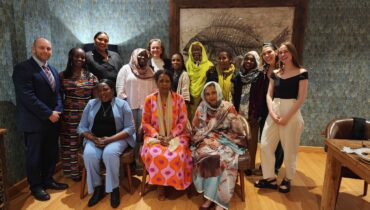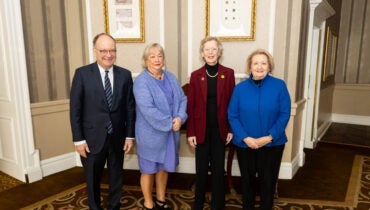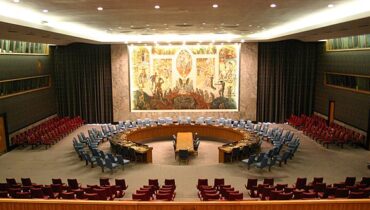Promoting security for women and girls in post-conflict environments does not only protect a human right but also holds the key to sustainable peace. If international efforts to sustain peace want to succeed they need to place gender-sensitive reforms at the forefront of their peacekeeping efforts. Unfortunately, women are still often overlooked as key players in reconciling conflict in communities. However, it is critical to include women informally and formally in all aspects of sustaining peace to ensure that the needs and views of the entire population are fully accounted for.
Securing the protection of women and girls from undue violence lies at the very heart of the challenge. In post-conflict settings, women often head households and become the economic anchor of their families, as a result of many men who were killed in decades of ongoing fighting. Not protecting women’s safety and livelihoods thus has significant negative effects on the development prospects of the communities and countries women live in. Moreover, women are vital to strengthening an often broken relationship between communities and governments’ security institutions, for example, by helping security forces to build trust and rapport with communities and bridge social and cultural divides.
The multifold and powerful role that women play in achieving and sustaining peace has been increasingly recognized. Strategic UN documents like the DPKO/DFS Gender Forward Looking Strategy 2014-2018 developed guidance on building a thorough gender architecture in post-conflict environments. In these documents, emphasis is put on women’s participation in peacekeeping operations, as these have a comparative advantage over other gender programs in fragile contexts: “Peacekeeping missions are well positioned to advance the elements of the Women Peace and Security resolutions given their mandates, their often extensive field presence and the access of its senior leaders to national governments.” At the same time, UN Women reports that only 4% of women were signatories to peace agreements from 1992 to 2011. Similarly, in 1993 women made up only 1% of deployed uniformed personnel of UN Peacekeeping Operations. By 2014, the share of female peacekeepers had only increased to 3% of military personnel and 10% of police personnel in UN Peacekeeping missions.
The appointment of gender advisers and gender focal points in peacekeeping missions has improved the integration of gender perspectives on components of peacekeeping operations spanning from military to policy to civilian efforts. Today, there are 8 gender advisers and 5 gender focal points addressing a total of 16 ongoing peacekeeping operations. Increased international awareness of the role of women in peacekeeping missions creates a window of opportunity to push for operationalizing meaningful gender-sensitive reforms.
Even though the call for a stronger role for women in conflict resolution has grown, the challenges in fully integrating gender perspectives continue to be sidelined amid competing agendas on the ground. Even if projects focusing on gender are implemented, it happens often in siloed activities as opposed to streamlining gender across different programs to sustain peace. The programs on security sector reform (SSR) within peacekeeping missions are a precedent for a viable entry point to integrate gender. Security sector reform entails assisting partner governments to provide effective, legitimate, and accountable security to its citizens. Through SSR, a comprehensive gender architecture in conflict-afflicted countries can be built. The marriage of both SSR and gender programs offers an operational answer to the complex challenge of effectively integrating gender in post-conflict environments.
An illustrative case of how linking SSR with gender provides an operational framework to tackle gender challenges in fragile contexts is the case of protecting women and girls from gender-based violence. The 2011 World Development Report noted a stunning 50% increase in sexual and gender-based violence (GBV) in Burundi from 2003 until 2006, a number that continued to rise after Burundi’s return to democracy. The UN mission in Somalia reported that, in 2013, rape was the most prevalent crime, making up 41% of all reported crimes. Although comprehensive data is unavailable, reports from organizations including the United Nations, DCAF, and IRC further confirm that security forces are not counteracting this problem: indeed, they are one of the key groups of perpetrators of GBV in post-conflict settings. Five gaps stand out when comprehensively addressing protection of women and girls:
- Underrepresentation of women in local security forces
- Lack of gender-sensitive laws and policies
- No institutionalized framework on gender-based violence
- History of abuse perpetrated by security forces and failure to protect citizens
- Culture of silence
Using SSR as a vehicle for facilitating gender-responsiveness across the relevant security institutions would be an effective way to address the aforementioned five gaps. Three policy recommendations could be considered accordingly to improve gender-responsiveness:
- Create an accountability system through a national GBV tracking system
A national GBV tracking system would address the major challenge of enhancing gender responsiveness in two ways. First, a tracking system would operationalize gender-sensitive policing through building structures to record, analyze, and respond to crimes against women. Second, it would create an accountability system for policing because, by tracking GBV, it would recognize that operations to protect women are important and that cases are documented. This system would also help to inform policy-making.
- Establish operating practices, incentive and performance measures through Gender units in each internal security force apparatus
Gender units would allow the operationalization of practices on a broader scale within the security forces. In addition, Gender units institutionalize enduring measures to respond to GBV and enforce reporting mechanisms. Finally, increased female representation would enhance responsiveness to security threats to women.
- Criminalize GBV through awareness raising in society
First, raising awareness about women’s rights and creating a culture in which GBV is a criminal offense could develop an atmosphere of safety for women to come forward and report cases of GBV. Second, it would break down the inhibiting culture of silence. Third, the involvement of counterparts from the security forces in awareness raising and outreach campaigning might contribute to a cultural change among security forces.
As the case of combatting GBV in post-conflict settings has illustrated, security sector reform provides an opportunity within UN Peacekeeping Operations to start building comprehensive gender architectures on the ground. Effectively aligning SSR and gender efforts of Peacekeeping Operations can propel the institutionalization of a gender perspective beyond a policy or strategic level and protect women from GBV. In the end, if the security needs of a population are not adequately accounted for, continued fragility will undo past development and hamper transition processes in the short- and long-term. Therefore, in order to unlock the potential of the role and resources of Peacekeeping Operations on the ground, the underlying challenges of women’s security need to be fully incorporated into peacekeeping programs. SSR offers a viable and effective avenue to utilize this potential to improve the security of women and stimulate sustained peace and development.
About the Author
Madita Weise conducted empirical research on women and peacebuilding as a research fellow for GIWPS at the United Nations Department for Peacekeeping Operations. She has worked with local NGOs in Egypt, Israel and Palestine, and Morocco on promoting rights of vulnerable populations. As a research assistant at the Berkley Center for Religion, Peace and World Affairs, Ms. Weise wrote on the evolution of women’s rights in family law in Muslim-majority countries. She is a 2015 graduate of Georgetown University’s Master of Science in Foreign Service program, where she specialized in international development and its nexus with security in fragile states. Ms. Weise completed her B.A. at the University of Amsterdam in Social Sciences. Since 2015, Ms. Weise works as a consultant at The World Bank on policy and strategy of the institution’s toolkit of development instruments.


